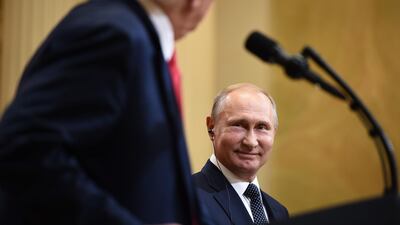The Helsinki summit between Donald Trump and Vladimir Putin has produced something unusual in a deeply divided America – near-unanimity on the right and on the left about the US president's startlingly craven behaviour towards the Russian leader.
Those who habitually criticise Mr Trump and even some of those who do not are saying much the same things and using some of the same words. Terms such as "treasonous", "disgusting", "Russian asset" and "Putin's poodle" are flying around. Nerds are reminding everyone that treason is the only crime specifically defined in the US Constitution and that Article III, Section 3, says it is the act of going to war against the United States or giving "aid or comfort" to an enemy. Could Mr Trump, they ask, be said to have given "aid or comfort" in Helsinki to America's long-time geopolitical adversary?
He certainly behaved in an unusual way, not just for a US president abroad, dealing with a foreign adversary, but by his own standards. Always a brash and domineering personality and for the past 18 months, a disputatious president, Mr Trump was uncharacteristically meek, deferential and undemanding, not to say unduly credulous towards the Russian leader.
The bipartisan American anger is focused on three things. While standing alongside Mr Putin at the press conference, Mr Trump attacked US institutions and American officials and politicians, seemed more willing to believe Mr Putin than his own intelligence agencies and suggested there was a moral equivalence between the US and Russia.
Americans, a patriotic people accustomed to the notion of exceptionalism, recoiled in disgust, especially at the last bit. For the first time in nearly three years, as Mr Trump rambunctiously and defiantly strode the political stage and gleefully stomped on all its norms, Americans seemed to be saying "not in my name".
The opposition Democrats were unsurprisingly apoplectic but prominent members of Mr Trump’s Republican Party have also spoken out, albeit with varying degrees of sharpness. These include Senate majority leader Mitch McConnell, House speaker Paul Ryan, senators Marco Rubio, Jeff Flake, Bob Corker, Ben Sasse, John McCain and Lindsey Graham. Republican congressman Will Hurd from Texas, himself a former CIA officer, was scathing in his criticism. Newt Gingrich, a former Republican speaker and one of Mr Trump’s strongest allies, has garnered many headlines for describing the Helsinki press conference as “the most serious mistake of his presidency”.
But it’s best not to get carried away. Mr Gingrich is a political has-been and has his hands full right now as the husband of Mr Trump’s ambassador to the Vatican. And almost all of Mr Trump’s prominent Republican critics are on their way out. Those who aren’t, such as Mr McConnell, Mr Rubio, Mr Graham and Mr Sasse, have not been critical about the president so much as hostile about Russia.
More significant than weasel words from Republican politicians is action. Accordingly, it’s worth taking the resignation on Monday night of a county Republican Party chairman from southeast Ohio seriously. Chris Gagin, who served in Belmont County, which swung to the Republicans in 2016 for the first time ever, said the Trump-Putin meeting was “a matter of conscience” and he was resigning out of a “sense of duty”. Trump-friendly Fox News’ sceptical tone about Mr Trump’s behaviour in Helsinki is also significant, at least for the moment.
That Mr Trump is being criticised for a foreign rather than domestic policy matter is also noteworthy. It is a truism that American voters don’t care about foreign affairs. What Mr Trump seems to have stirred, however, by equating the US with the Russian Federation, is the indignation of the hitherto self-assured.
Helsinki is being described as the foreign policy equivalent of Charlottesville. Last summer Mr Trump likened aggressive white nationalist marchers in Charlottesville, Virginia, with the peaceful activists who protested against their divisiveness. The moral equivalence was considered a low point of the US presidency and so it is with Helsinki.
But Charlottesville is also a reminder that Mr Trump has set massive storms a-rolling before and weathered them too.
What’s clear is the Helsinki summit has produced almost nothing tangible or of benefit either for the US or the world. After two hours of quiet time, behind closed doors, sans advisers and with only a couple of interpreters present, the two presidents had lunch with aides and delivered the pitiful results of their discussions to a waiting world. Neither said anything new or significant about arms control, Russia’s role in Syria, Crimea and Ukraine or British allegations that Russia poisoned people on its soil.
No one will ever know their discussions, if any, on these sensitive topics because there is no record of the golden 120 private minutes, nor what it was that prompted Mr Trump’s submission to Mr Putin.
But there is outrageous speculation of every kind and, in politics as much as finance, it can make or mar a brand. As a businessman, a reality TV star and a politician, Mr Trump, more than anyone, must know that well.


